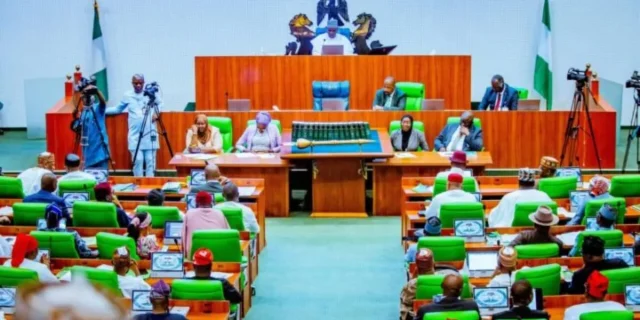…Lawmakers of Southern extraction supported minimum of Degree Equivalent
… Northern Lawmakers insisted on Primary School or Equivalent
…”In the case of INEC, what we saw Professors do is terrible” – Hon Aliyu Madaki
A mild drama ensure yesterday on the floor of the House of Representatives, Abuja. The drama, sadly, was the return of regional colouration, one of the numerous affiliations that have pegged the nation to one spot without any meaningful growth.
A bill to make Higher Education Compulsory for Presidential, Gubernatorial and Legislative candidates, sponsored by Oriyomi Onanuga (APC, Ogun) seeking to amend sections 65, 106, 131 and 171 of the 1999 constitution was vehemently rejected predominantly by members of Northern extraction. The bill seek to make degree or degree equivalent the minimum educational qualification required to contest election, thereby upgrading it from the Primary School or it’s equivalent qualification that is in the constitution
Leading the debate on the bill, which last over two hours, Hon Onanuga explained that the bill would raise the educational qualifications in Nigeria to a minimum of a degree and its equivalent. She therefore, solicited for her colleagues support, saying the upgrade was long overdue
Minority Leader of the House, Hon Kingsley Chinda of PDP from Rivers State supported the motion saying that the constitution must be in tandem with the current educational realities of the country. He argued “are you telling me that a school certificate holder in 1960 is the same thing as today? In the past, primary school students were drafted to be teachers?” He asked “can a primary school holder get a job in private establishments?” He further urged his colleagues to “do the proper thing”. His view was supported by so many members who coincidentally are from the Southern part of the country
Speaking against the bill, Aliyu Madaki (NNPP, Kano), said the bill could create an elitist society where only a group of people is allowed to participate in politics.
Mr Madaki said the bill would not affect him or his children, but laws should be made in the interest of the greater majority.
“Your leadership quality is not determined by education. I have three grown-up children; they are all in universities. What we are trying to do is about all Nigerians. The level of education is not in the constitutions of some states. In the case of INEC, what we saw the professors do is terrible.
“As a person, I hold an MBA, but it is not about the individual. It is about the collective. I believe we should allow that section of the constitution to stay,” he said.
Several other lawmakers also spoke against the bill, citing exclusion as the reason for their positions against the bill.
Some of the lawmakers who spoke against the bill include Kabir Maipalace (PDP, Zamfara), Ahmed Jaha (APC, Borno), Bello Kumo (APC, Gombe), and others.
Following the stiff opposition, Mrs Onanuga succumbed to pressure and humbly requested to step down the motion for further consultation.
The bill was therefore, stepped down by Rt Hon Benjamin Kalu who presided over the house.









